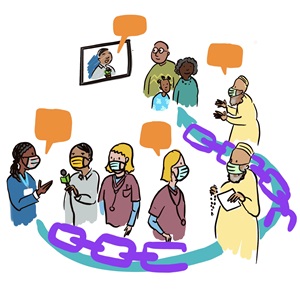Learning opportunity: Effective storytelling to communicate about infodemics, their impact and how to contribute to infodemic management practice
26 July 2022 at 16:00 CEST-Geneva | 14:00 UTC | 10:00 EDT-Washington, DC

Stories fuel infodemics. By understanding how emotive storytelling is successful in reaching audiences and causing narratives to go viral, infodemic managers can reverse engineer the same approach to tell their own stories about working in the trenches, managing the infodemic in the time of COVID-19 and being more effective in their jobs.
Infodemics consist of narratives that shape and shift over time. Understanding how stories are constructed and what emotional and cognitive shortcuts they rely on to spread quickly are skills every storyteller knows. These are skills that are also invaluable for infodemic managers to tell their own stories of how they experienced the pandemic and accompanying infodemic personally and professionally. Through building these storytelling skills, infodemic managers can become more effective communicators and explain to others what infodemic management looks like in practice, and the types of strategies that worked (and didn’t work).
WHO in partnership with The Story Collider want to build skills for public health practitioners to promote science and health through the craft of personal storytelling. This webinar is part of an announcement of an upcoming training and evaluation project to build capacity among infodemic managers to tell effective stories from the field.
Speakers
Tina Purnat
Tina Purnat is Team Lead for Infodemic Management in the Unit for High Impact Events Preparedness, Department of Epidemic and Pandemic Preparedness and Prevention at WHO. She has worked for over 20 years at the WHO, European Union and academia, Her expertise amalgamates health research, analysis and policy-making with an emphasis on promoting the use of health information and evidence in decision-making and for policy-making. As part of the WHO COVID-19 response, she worked in developing and formulating WHO infodemic response and infodemic management interventions, for which she received the WHO Pathfinder and Innovation Award 2021.
Maryam Zaringhalam
Maryam is a Senior Producer for the Story Collider, producing and hosting shows in the Washington, D.C. area since 2017. A molecular biologist by training, she traded in her pipettes for the world of science communication, policy, and advocacy. She received her PhD from The Rockefeller University in 2017 and her writing has appeared in Nature, Scientific American, and the Washington Post.
Claire Wardle
Professor of the Practice at Brown University School of Public Health, is co-founder and co-director of the Information Futures Lab there. Previously she was the Executive Director and co-founder of First Draft, a non-profit working on solutions to challenges associated with trust & truth in the digital age. Claire is the world expert on the misinformation and managing its harms, having worked in a variety of social topics across several continents.
